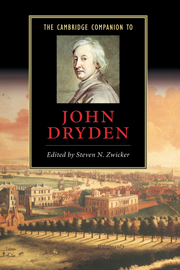Book contents
- Frontmatter
- Part 1 Pleasures of the imagination
- 1 Composing a literary life
- 2 Dryden and the theatrical imagination
- 3 Dryden and the energies of satire
- 4 Dryden and the imperial imagination
- 5 Dryden and the invention of Augustan culture
- 6 Dryden’s triplets
- Part 2 A literary life in Restoration England
- Part 3 Courting and complying with danger
- Further reading
- Index
- Series List
6 - Dryden’s triplets
from Part 1 - Pleasures of the imagination
Published online by Cambridge University Press: 28 May 2006
- Frontmatter
- Part 1 Pleasures of the imagination
- 1 Composing a literary life
- 2 Dryden and the theatrical imagination
- 3 Dryden and the energies of satire
- 4 Dryden and the imperial imagination
- 5 Dryden and the invention of Augustan culture
- 6 Dryden’s triplets
- Part 2 A literary life in Restoration England
- Part 3 Courting and complying with danger
- Further reading
- Index
- Series List
Summary
Dryden was sovereign of the heroic line and of the heroic couplet. In the Discourse concerning the Original and Progress of Satire with which he prefaced his translation of Juvenal (1693), he ruled that “The English Verse, which we call Heroique, consists of no more than Ten Syllables” (Works iv: 88). Not strictly true, such a syllable-count, as everyone knows who has ever felt a bit blank as to what exactly is an iambic pentameter or a line of blank verse. But what of any larger count, such as of lines? Two by two? The heroic couplet has always been recognized as both the favored means and a characteristic flavor of Dryden's art, keen as he was to pursue and to outdo the instrumental skill shown in the 1640s by Edmund Waller and by Sir John Denham. But the heroic triplet? This is neither a term that is in use nor an accomplishment that is much appreciated.
- Type
- Chapter
- Information
- The Cambridge Companion to John Dryden , pp. 92 - 110Publisher: Cambridge University PressPrint publication year: 2004
- 1
- Cited by



